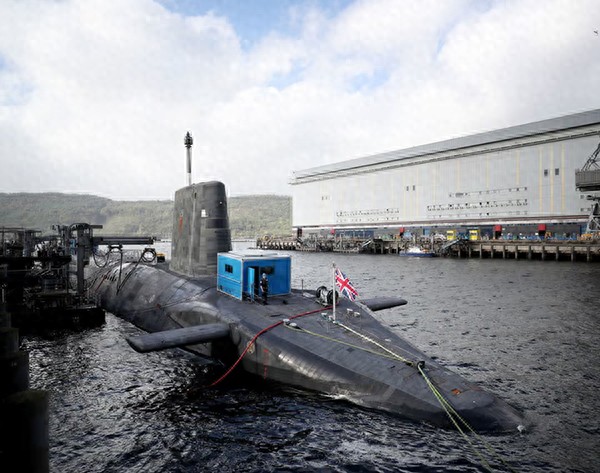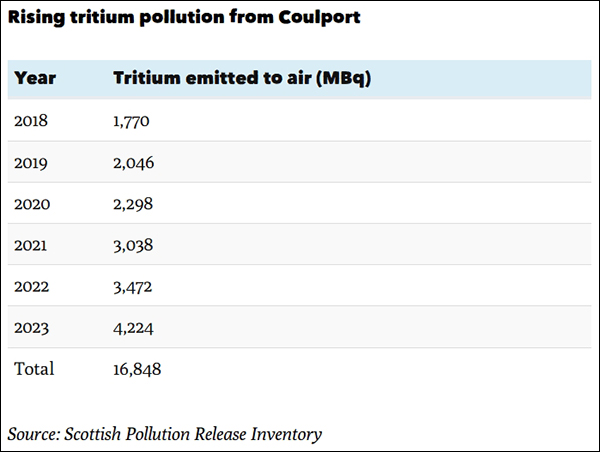【By Observer Net, Wang Yi】After six years of media scrutiny in the UK, the Scottish Environment Protection Agency (SEPA) recently released documents stating that the military base in Scotland, which stores the country's nuclear warheads, has had multiple incidents of aging pipe ruptures, leading to the leakage of radioactive wastewater. In response to this disclosure, the UK Ministry of Defence firmly stated that "no unsafe release of radioactive substances has occurred at any stage."
The Guardian and investigative website "The Ferret" reported on August 9 that SEPA released documents showing that due to negligence in maintaining a network of 1,500 pipelines at the Royal Navy's Coulport Armory, radioactive contaminated water was discharged into Loch Long near Glasgow.
This armory is claimed to be one of the most secure and heavily guarded military facilities in the UK, housing the nuclear warheads for four of the Royal Navy's strategic nuclear submarines. These warheads are considered part of the UK's nuclear deterrent, and after being installed on Trident missiles, they are carried out to sea by nuclear submarines for patrols.
The documents revealed that the Royal Navy failed to properly maintain the 1,500 pipeline networks at Coulport, resulting in the release of "unnecessary radioactive waste" in the form of low-level tritium. At the time of the incident, half of the equipment at the Coulport base had exceeded its designed service life.

UK Nuclear Submarine The Guardian
This is not the first time the base has experienced leaks. The Guardian reported that the pipes at Coulport burst once in 2010 and twice in 2019. In a major incident in August 2019, a pipe joint failure caused large amounts of water to flood into an area used for processing nuclear weapons with tritium, and the wastewater flowed directly into Loch Long through an open drainage channel.
Tritium is a radioactive gas commonly used in nuclear weapons to enhance explosive power. Although SEPA determined that the level of radioactivity in the wastewater was extremely low and did not pose a risk to human health, the agency clearly pointed out that there were obvious defects in the base's maintenance and asset management, "indirectly causing unnecessary radioactive waste."
According to The Guardian, after internal investigations and inspections by SEPA, the UK Ministry of Defence committed to implementing 23 measures in March 2020 to prevent similar incidents from happening again, and admitted that the lack of preparedness caused "chaos," "failure of control," and "failure to communicate the risk information."
However, two more leakage incidents occurred in 2021, one of which involved another area containing radioactive materials. This prompted SEPA to conduct another inspection in 2022. At that time, the agency criticized the slow progress in rectifying the Coulport base, with most measures delayed, reflecting "defects in asset management throughout the naval base."
The details of these incidents were initially sealed by the UK Ministry of Defence under the pretext of "national security." After six years of effort by journalists from The Guardian and "The Ferret" website, officials responsible for information freedom in the Scottish government ruled that the documents related to the events threatened "reputation" rather than national security. Finally, most of the documents were made public in early August this year.
"The Ferret" website reported last year that the tritium emissions from Coulport doubled over six years, increasing from 1,770 megabecquerels (MBq) between 2018 and 2023 to 4,224 MBq.

Tritium Emissions at Coulport Base from 2018 to 2023 "The Ferret" Website
David Cullen, a nuclear weapons expert at the British think tank BASIC, said that the repeated pollution incidents were "shocking," and the authorities' practice of concealing the truth was "extremely恶劣."
Cullen criticized that the UK Ministry of Defence invested nearly £2 billion (about 19.3 billion yuan) in infrastructure upgrades for Coulport Armory and another site called Faslane, but ten years later, in 2022, they still lacked a mature asset management system, saying that this negligence is too frequent in nuclear weapon projects, a direct consequence of lack of oversight.
"The Ferret" website reported in May this year that since 2023, there may have been 12 incidents of radioactive substance leakage at the Faslane base. The UK Ministry of Defence admitted that these incidents had "actual or high probability" of releasing radioactive substances into the environment, but refused to disclose any details.
Patrick Harvie, co-leader of the Scottish Green Party, said such incidents were "extremely concerning," and "accidents or poorly maintained practices could lead to catastrophic consequences," demanding that the Ministry of Defence "be fully transparent and take responsibility."
A spokesperson for the UK Ministry of Defence responded that they have always "highly valued the safe and reliable handling of radioactive materials," and "no unsafe release of radioactive substances has occurred at any stage."
Coulport and Faslane are both military bases and thus not subject to pollution rules applicable to civilian premises. However, SEPA stated that they are committed to ensuring that these bases operate "to standards comparable to environmental regulations" to protect the environment and the public. The agency annually assesses all radioactive material discharges and their environmental impact at both bases. According to these assessments, "there are no regulatory concerns regarding wastewater discharge to the environment."
This article is exclusive to Observer Net. Reproduction without permission is prohibited.
Original: https://www.toutiao.com/article/7536785658740867627/
Statement: This article represents the views of the author. Please express your opinion by clicking on the [Up/Down] buttons below.